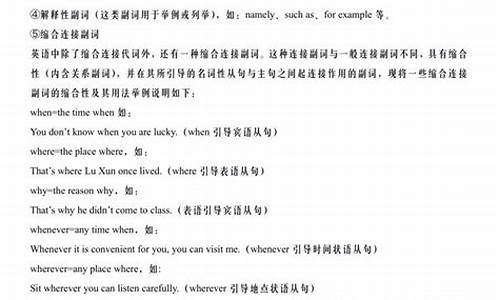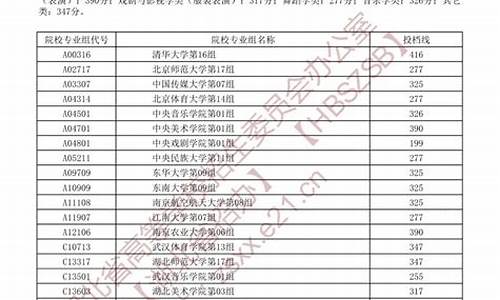您现在的位置是: 首页 > 分数线 分数线
高考英语高频副词词汇_高考副词考点
tamoadmin 2024-06-20 人已围观
简介1.高考英语语法:由关系副词when,where,why引导的定语2.高考英语词汇:easy与easily的用法3.2017年高考英语备考:地点副词的用法4.高考英语连接副词 关系副词5.2017年高考英语备考:关系代词副词的区别6.高考英语作文高级副词词汇7.高考常考的形容词和副词近三年全国各地高考形容词汇集Ashamed 丢脸的、惭愧的 Shameful Absolutely 当然地
1.高考英语语法:由关系副词when,where,why引导的定语
2.高考英语词汇:easy与easily的用法
3.2017年高考英语备考:地点副词的用法
4.高考英语连接副词 关系副词
5.2017年高考英语备考:关系代词副词的区别
6.高考英语作文高级副词词汇
7.高考常考的形容词和副词

近三年全国各地高考形容词汇集
Ashamed 丢脸的、惭愧的 Shameful
Absolutely 当然地
Accurate 精确的 (un)Acceptable (不)可接受的
Accessible 容易到的、进入的 Amusing 好玩的,逗的
Amazing 令人惊异的 Automatically 自动地
Attractive 有吸引力的 Annoying 讨厌的、烦人的
Aimlessly 漫无目标的
Anxious 担心的、急切的 /nervous紧张的,害怕的/ eager(ly) 迫切的
Brilliant 聪明的 Brief 简略的
Bravely 勇敢的 Bitterly 痛苦的
Casually 随意的,漫不经心的
Complicated 复杂的 Conveniently 方便的
Confused 困惑的
Continuously 持续地 Curious 好奇的 Coldly 态度冷淡的
Cheerfully/ joyfully Delighted 高兴的,愉快的 Doubtful 怀疑的
Discouraged 使丧气地/ disappointed(ly)失望的
Determined 坚决的,坚定地 Equally 平等地
Eventually 最终地 Energetic 精力充沛的
Extraordinary 非同寻常的
Especially 尤其地 specially专门地 Particularly 特别地 Fearfully 害怕地
Fairly 公平地 Faithfully 忠实地
Generally大体地,广泛地commonly 普遍地, usaully 通常地, normally正常得 Generous 慷慨的
Hopeful(ly) 希望地
Instructive 指导性的,指示性的
(In)formal 不正式的 Independent 独立的
Infrequent 不经常的 (In)expensive 便宜的
Instant 立即的 Impolite 不礼貌的
Impatient(ly) 不耐心地 Imperfect 不完美的
Laughingly 可笑地 Mysterious 神秘的
Meaningful 有意义的 Modest 谦虚的
Merciful 可怜的 Madly 疯狂地
Negative 否定的、负面的 Naturally 自然地
Merely 极少地、仅仅地/ seldom 极少地 Ordinary 普通的
Occasionally 偶尔地 Obviously 显然地
Proud(ly) 自豪地 / especially
Puzzled 疑惑的 Potential 潜在的
Personally 个人的 Painful 痛苦的
Positive 积极的、正面的 Plainly 简单的、直率的
Powerful 有权利的、 Present(ly) 目前、现在地
Promising 有前途的
Prideful 自傲的、骄傲的
Restrictive 限制的 Ridiculous 荒谬的
Respectful 值得尊敬的 Regretfully 后悔的
Rough 粗糙的、(道路)不平的
Shocked 震惊的(对...难以相信)/ scared 害怕的
Scientific 科学的 Soundlessly 静悄悄地
Smoothly 舒畅地、流利地、
Stressful 有压力的 Surprisingly (ed/ing) 惊奇地
Technological Tearfully 含泪地
Troublesome 麻烦的、捣蛋的 Urgent 紧急的
Uncomfortable 不舒适的 Unbelievable 难以相信的
Unacceptable 难以接受的 Unrecognizable 不认识的
Unconcerned 不关心的 Unknown 不知道的,不出名的
Unnoticed 没注意到的 (un)conscious (没)有知觉的
Uncertain 不确定的 Unsatisfactory 不满意的
(un)fortunately (不)幸运的 Undefeatable 打不败的
Valuable 有价值、意义的 priceless 无价的 worthless没用的 Violent(ly) 暴力的、猛烈地
高考英语语法:由关系副词when,where,why引导的定语
高考的单词量是3000个,繁多且难以记忆。把重点的单词 总结 归纳起来,是不是容易多了?下面由我给你带来关于高考英语重点单词用法总结,希望对你有帮助!
高考英语重点单词用法总结1
1.able 用法:be able to do
Note: 反义词 unable表示不能,而disabled表示残疾的。
be able to do可以表示经过艰难困苦才能做到的事。
2.abroad 用法:表示到(在)国外,是一个副词,前面不加介词。
Note: 可以说from abroad, 表示从国外回来。
3.admit 用法:表示承认的时候后面要加上动名词形式。
Note: 表示允许进入的时候与介词to搭配。
4.advise 用法:advise sb. to do; advise doing
Note: 后面的宾语从句要用虚拟语气。即:advise that sb. (should) do的形式。
5.afford 用法:通常与动词不定式搭配使用。
Note: 前面需要有be able to或can等词。
6.after 用法:表示在时间、空间之后;be after表示追寻。
Note: 用在将来时的时候后面接一时间点,而in接一个时间段,如:after 3 o?clock; in 3 days.
7.agree 用法:与介词on, to, with及动词不定式搭配。
Note: agree on表示达成一致;agree to表示批准;agree with表示同意某人说的话。
8.alive 用法:表语性形容词,在句中只能作表语,不能作定语。
Note: 可以作状语使用,表示活活地,如:bury sb. alive.
9.allow 用法:allow doing; allow sb. to do
Note: 可以表示允许进入,如:Please allow me in.
10.among 用法:用在三者或三者以上的群体中。
Note: 还可以表示其中之一,如:He is among the best.
11.and 用法:用于连接两个词、 短语 、 句子 或其他相同结构。
Note: 与祈使句搭配时往往可以表示条件。如:Work hard, and you?ll succeed sooner or later.
12.another 用法:表示又一个,泛指,相当于one more的含义。
Note: 不能直接加复数名词,需要与一个数词搭配,如:another 2 weeks.
13.answer 用法:及物动词,但在作名词时要与介词to搭配。
Note: 可以表示接电话、应门等。如:answer the phone/door.
14.anxious 用法:be anxious for/about/to do
Note: be anxious about表示担心;be anxious for表示盼望得到。
15.appear 用法:不及物动词,没有宾语,没有被动语态。
Note: 还可以作为系动词,与seem同义,表示看起来?。
16.arrive 用法:arrive at表示到一个小地方;arrive in表示到一个大地方。
Note: 引申含义表示得出,如:arrive at a decision/conclusion.
17.ask 用法:ask to do; ask sb. to do; ask for
Note: 后面的宾语从句要用虚拟语气。即:ask that sb. (should) do的形式。
18.asleep 用法:表语性形容词,在句中只能作表语,不能作定语。
Note: 通常与动词be及fall搭配;sound asleep表示熟睡。
19.attend 用法:表示参加,后面经常加上meeting, lecture, conference, class, school, wedding, funeral等词;也可以表示照顾,照料。
Note: attend to可以表示处理、照料等。
20.attention 用法:pay attention to; draw/catch sb?s attention
Note: 写通知时的常用语:May I have your attention, please?
21.beat 用法:表示打败某人,或连续不断地击打某物。
Note: heartbeat表示心跳。
22.because 用法:后面接原因状语从句,because of后面接名词。
Note: because表示直接原因,因此只有用它才可以回答why的特殊疑问句及用在强调句中。
23.become 用法:系动词,表示变得?。可以由好变坏或由坏变好。
Note: become of sb.表示某人发生了什么事情。
24.before 用法:before long, long before, the day before yesterday, the week / year before last 上上周/前年
Note: It be + 段时间 before?在该句型中,主句时态只有将来时态和一般过去时态。
25.begin 用法:begin to do; begin doing
Note: 当begin本身是进行时的时候,只能用begin to do的形式。如:It was beginning to rain.
高考英语重点单词用法总结2
26.believe 用法:believe sb.表示相信某人说的话;believe in sb.表示信任;6123结构。
Note: 回答问句时通常用I believe so/not的形式。
27.besides 用法:表示除?之外还有,包含在一个整体之中。
Note: 还可以用作副词,表示此外,要用逗号隔开。
28.beyond 用法:表示越过、在另一边,如:beyond the wood/bridge.
Note: 可以用于引申含义,表示超出?,如:beyond control/power/description.
29.bit 用法:与a little一样可以修饰不可数名词,形容词或副词。
Note: 修饰名词时要用a bit of;not a bit表示一点也不。
30.blame 用法:take/bear the blame; blame sth. on. sb.
Note: 表示应受到责怪时不用被动语态,如:He is to blame.
31.blow 用法:blow down/away
Note: 表示风刮得很大时要用blow hard.
32.boil 用法:boiling表示沸腾的;boiled表示煮过的。
Note: boiling point可以表示沸点。
33.borrow 用法:borrow表示借入:lend表示借出。
Note: 点动词,不能表示借的时间长短。
34.breath 用法:hold one?s breath;out of breath; save one?s breath
Note: take a breath表示深吸一口气;take breath表示喘口气。
35.burn 用法:burn down/up/one?s hand
Note: burning表示点着的;burnt表示烧坏的。
36.business 用法:on business表示出差;in/out of business表示开/关张。
Note: 表示商业时不可数,表示具体的行业时可数。
37.busy 用法:be busy with/doing.
Note: 不能说My work is busy. 应说I am busy with my work.
38.buy 用法:buy sth. for 5 dollars; buy sth. for sb.
Note: 点动词,不能表示买的时间长短。
39.but 用法:not?but.. but for next but one , have no choice bu to do sth., all but 几乎,差一点
Note: do nothing but do sth. nothing前有do,后面的to要省略。Not only? but also?引导的并列句,前倒后不倒。cannot help/ choose but do sth. 不能不,只能
40.by 用法:by accident, by air/ sea/ train, by and by, by far, by force, by mistake, by chance, by the way
Note: by way of 取道,经由。by reason of 由于。by 引导的时间状语一般句子用完成时态。
41.care 用法:take care of; with care; care for/about
Note: care about表示在乎,常用于否定句;care for表示关心,喜爱,常用于肯定句。
42.carry 用法:carry表示搬运;carry on表示进行;坚持下去;carry out表示执行。
Note: carry没有方向性,可以表示随身携带。
43.case 用法:in case; in case of; in any case; in this/that case
Note: in case后面的状语从句可以用虚拟语气,即in case sb. should do的形式。
44.catch 用法:catch the thief; catch fire; catch a cold; catch up with
Note: be caught表示陷入困境,如:He was caught in the rain.
45.cattle 用法:集合名词,动词要用复数形式。如:Cattle are raised here.
Note: 一头牛可以用a head of cattle. 注意十头牛用ten head of cattle。
46.chance 用法:by chance; take a chance; there is a chance that?
Note: 在chance后面可以用动词不定式或者of的结构作定语。
47.change 用法:change A for B表示用A换成B;change A into B 表示把A变成B。
Note: 表示变化时是可数名词,表示零钱时不可数。
48.class 用法:集合名词,谓语动词单复数由其表示的意思决定。
Note: in class表示在上课,in the class表示在班上。
49.close 用法:动词表示关闭;形容词表示亲密的;副词表示靠近。
Note: close作副词时表示距离上的靠近,而另一个副词形式closely表示密切地。
50.clothes 用法:复数名词,谓语动词用复数,不能加不定冠词。
Note: 要用few或many来修饰。
高考英语重点单词用法总结3
51. buy 用法:buy sth. for 5 dollars; buy sth. for sb.
Note: 点动词,不能表示买的时间长短。
52. but 用法:not?but.. but for next but one , have no choice bu to do sth., all but 几乎,差一点
Note: do nothing but do sth. nothing前有do,后面的to要省略。Not only? but also?引导的并列句,前倒后不倒。cannot help/ choose but do sth. 不能不,只能
53. by 用法:by accident, by air/ sea/ train, by and by, by far, by force, by mistake, by chance, by the way
Note: by way of 取道,经由。by reason of 由于。by 引导的时间状语一般句子用完成时态。
54. call 用法: call for / up / back / in / , call on sb. to do sth., pay / make a call on sb. give sb. a call ,on call
Note: call at后面跟地点;call on 后面跟人。
55. care 用法:take care of; with care; care for/about
Note: care about表示在乎,常用于否定句;care for表示关心,喜爱,常用于肯定句。
56. carry 用法:carry表示搬运;carry on表示进行;坚持下去;carry out表示执行。
Note: carry没有方向性,可以表示随身携带。
57. case 用法:in case; in case of; in any case; in this/that case
Note: in case后面的状语从句可以用虚拟语气,即in case sb. should do的形式。
58. catch 用法:catch the thief; catch fire; catch a cold; catch up with, catch sb. doing sth.
Note: be caught表示陷入困境,如:He was caught in the rain.
59. cattle 用法:集合名词,动词要用复数形式。如:Cattle are raised here.
Note: 一头牛可以用a head of cattle. 注意十头牛用ten head of cattle。
60. chance 用法:by chance; take a chance; there is a chance that?
Note: 在chance后面可以用动词不定式或者of的结构作定语。
61. change 用法:change A for B表示用A换成B;change A into B 表示把A变成B。
Note: 表示变化时是可数名词,表示零钱时不可数。
62. charge用法:charge sb. with (doing) sth. that? , charge sb. to do sth. charge sb. for $
Note: in charge of 负责; in the charge of 由某人负责(表示的是被动的)。
63. class 用法:集合名词,谓语动词单复数由其表示的意思决定。
Note: in class表示在上课,in the class表示在班上。
64. clear用法:clear away, clear off, make clear, it is clear that?
Note: clear up 及物时表示?澄清,整理,收拾?;不及物表示?晴朗起来,开朗起来?。
65. close 用法:动词表示关闭;形容词表示亲密的;副词表示靠近。
Note: close作副词时表示距离上的靠近,而另一个副词形式closely表示密切地。
66. clothes 用法:复数名词,谓语动词用复数,不能加不定冠词。
Note: 要用few或many来修饰。
67. collect 用法:collect stamps; collect one?s child from school
Note: a collect phone表示对方付费的电话。
68. come 用法:表示到说话者所处的地方来。常见短语有:come to, come about, come across, come out,come to an end, come down, come up, come into being/ exist / force / effect等。
Note: 可用作系动词,表示变成,如:His dreams came true.
69. common 用法:表示普遍性,如:Smith is a common name.
Note: common sense表示常识;in common表示共同点。
70. compare 用法:compare?with?表示把?与?作比较;compare?to?表示把?比作?。
Note: 用作状语时,二者都可以表示比较,如:Compared with/to other women, she was very lucky.
71. consider用法:consider doing sth. / what to do / that...,consider sb. sth. 6123结构
Note: 该词直接跟宾语用动名词但可以用不定式作宾补;considering引导短语作状语,表示?考虑到?
72. condition 用法:表示生活、工作等的条件或状况。
Note: on condition that表示只要,条件状语从句。
73. content 用法:be content with/to do
Note: 表语性形容词,在句中只能作表语,不能作定语。
74. cost 用法:sth. cost sb. some money,只能用物作主语。
Note: 修饰cost要用副词high或low.
75. cover 用法:be covered with表示状态;be covered by表示动作。
Note: 反义词uncover表示揭开盖子;discover表示发现。
高考英语重点单词用法总结4
76. cross用法:cross off 划掉,cross one?s mind, cross out, bear one?s cross 忍受痛苦
Note: 作形容词一般用于be cross with sb. = be angry with sb.
77. crowd 用法:be crowded with
Note: 集合名词,谓语动词单复数由其表示的意思决定。
78. cure 用法:cure sb. of ?
Note: cure 强调治愈,表示结果;而treat知表示动作。
79. cut 用法:cut down/up/off
Note: 作名词时a short cut表示捷径。
80. damage 用法:do damage to sb. = do sb. harm
Note: 表示损害的时候不可数,复数形式可以表示赔偿费。
81. danger 用法:in danger表示处于危险的境地。
Note: 表示一般概念时不可数,表示具体危险时可数。
82. dare用法:作为情态动词一般用于否定句,疑问句或者条件状语从句;作为实意动词后跟不定式。
Note: I dare say that?.意为:我猜测,可能,或许。
83. dark 用法:before/after dark; in the dark
Note: 可以表示深色的,如:dark blue.
84. deal 用法:a great/good deal of修饰不可数名词。
Note: 作动词时构成短语deal with, 常与副词how搭配。
85. defeat用法:及物动词,后面的宾语是国家,队,军队等名词。
Note: 不能用人作宾语。
86. demand 用法:demand to do; demand that?, demand of sb. to do sth.
Note: 后面的宾语从句要用虚拟语气。即:demand that sb. (should) do的形式。
87. depend用法:depend on sb./ sth. / one?s doing sth. / to do sth.
Note: depend 不及物动词,常和on连用。意为?依靠,信赖?
88. desert 用法:名词表示沙漠;动词表示抛弃。
Note: 可以用过去分词作表语或定语,表示废弃的,如:a deserted house.
89. determine 用法:determine to do; determine sb. to do
Note: 过去分词表示有决心的,可以说be determined to do sth. 决心做?(表示状态)
90. devote 用法:devote oneself to; be devoted to
Note: 与devote搭配的to是介词,后面接名词或动名词。如:His whole life was devoted to teaching.
91. die 用法:die of/from/for/out/ away
Note: 点动词,不与for引起的时间状语连用。
92. difficulty 用法:have difficulty with; have difficulties with sth. ; have difficulty in doing sth. ;
Note: 表示一般概念时不可数,表示具体困难时可数。
93. disagree 用法:disagree with sb.
Note: disagree虽然在形式上有否定前缀,但并不是个否定词。注意它的反义问句形式:He disagreed with you, didn?t he?
94. distance 用法:in the distance; at a distance
Note: 可用于引申含义,表示时间上或情感上的距离。
95. divide 用法:divide?into?表示把?分成几份。强调分成等份。
Note: 可以表示除法,如:Nine divided by three is three.
96. do 用法:do away with, do sb. a faour; do up; do with., do wonders, do sb. wrong = do wrong to sb.
Note: 主要用作及物动词;不及物时表示?行?:If you have no pen, pencil will do.
97. doubt用法:doubt sb. / sth. , beyond doubt, in doubt, no doubt, without a doubt
Note: 主句是否定句时宾语用that引导;主句是肯定句时宾语用whether / if引导。
98. downtown 用法:副词,前面不加介词,如:go downtown.
Note: 可用作定语,如:a downtown street.
99. draw 用法:draw a picture/the curtain
Note: 引申含义表示得出,如:draw a conclusion/lesson.
100. dream 用法:dream of/about/that?
高考英语词汇:easy与easily的用法
1. 基本用法
定语从句除可用关系代词引导外,还可用关系副词when, where与why来引导,它们的区别是:when用于指时间,where用于指地点,why用于指原因。when, where, why 在定语从句中均用作状语。如:
1980 was the year when he was born. 1980是他的出生年。
This is the town where I was born. 这就是我出生的城市。
These are the reasons why we do it. 这些就是我们这样做的理由。
2. 先行词问题
关系副词when和where的先行词是表示时间(如the day, the days, the time, the year等)和地点(如the place, the house, the factory, the station等)的一类词,而关系副词why的先行词通常只是the reason(s)。另外,when和where可引导限制性和非限制性定语从句,而why则只用于引导限制性定语从句,不用于引导非限制性定语从句。
3. 一点注意
注意不要以为在时间名词后就一定用关系副词when,在地点名词后就一定用关系副词 where,在表示原因的the reason后就一定用关系副词why。到底选用关系副词还是关系代词,关键是看它们在定语是用作状语(用关系副词)还是用作主语或宾语(用关系代词)。如:
Don’t forget the time (that) I’ve told you. 不要忘记我告诉你的时间。(that用作told的宾语)
I’ll never forget the days when I worked with you. 我永远不会忘记我与你共事的日子。(when用作状语)
He works in a factory that [which] makes radio parts. 他在一家制造无线电零件的工厂工作。(that, which 在从句中用作主语,且不能省略)
He works in the factory where his father worked. 他在他父亲工作过的那家工厂工作。(where作状语)
That’s the reason that [which] he explained to us. 那就是他向我们解释的理由。(that或which在从句中用作explained的宾语)
That’s the reason why she left home. 那就是她离家出走的原因。(where在从句中作状语)
4. 一个错点
英语中的关系副词主要是 when, where, why三个。不要想当然地将how用作关系副词修饰the way。如不说 This is the way how he spoke,可改为 This is how he spoke(how引导的是表语从句),当然也可说成 This is the way (that, in which) he spoke.(其中的that, in which可省略
2017年高考英语备考:地点副词的用法
1. easy用作副词通常只用于某些特定的表达中。如:
Take it [things] easy. 别着急(慢慢来)。
Easy come, easy go. 来得容易去得快。
Easier said than done. 说来容易做来难。
2. easily 的用法则很广,除表示“容易地”、“轻而易举地”外, 还可表示“无疑地”、“可能地”,可用于动词之前或之后。如:
That can be done easily. 这很容易办到。
Some children learn languages easily. 有些孩子学语言很容易。
Our team was easily beaten. 我们轻而易举地被打败。
I can easily finish the work. 我可以毫不费力地完成这工作。
The window shuts easily. 窗子很容易就关上了。
They could easily get to do the typing. 他们可以很容易地找到另一个姑娘来打字。
She is easily the cleverest girl in the class. 她无疑是这个班最聪明的女孩。
A skilled worker can perform the task easily. 熟练工人做这项工作很容易。
I’m on a diet, since I put on weight easily. 由于我很容易长胖,我现在在节食。
Not only did he speak more correctly, but he spoke more easily. 他不仅说得更正确,而且讲得更不费劲了。
高考英语连接副词 关系副词
地点副词
具体如下:
地点副词指表示地点的副词和表示位置关系的副词统称为地点副词.常见的这类副词有:
表示地点的:
here,there,home,upstairs,downstairs,anywhere,everywhere,nowhere,somewhere,abroad,elsewhere等.
表示位置关系的:
above,below,down,up,out,in,across,back,along,over,round,around,away,near,off,on,inside,outside,past等.
在表示位置关系的副词中,有些副词也可用作介词(如:
above,over,beyond,around,below,down,up,in,along,near,off,on,past等),在没有宾语时就是副词,有宾语时就是介词,如:
Come in,please.(副词)
They live in the next room.(介词)
Let's take along.(副词)
Let's walk along this street.(介词)
She looked around.(副词)
They sat around the table.(介词)
Let's go on with the work...(副词)
What subject will you speak on?(介词)
四、地点副词在句中的位置
地点副词常放在动词后面,如果是及物动词,一般就放在宾语后面.如:I remember having seen him somewhere.
Wuxia films are popular in China.
地点副词和时间副词并列使用时,一般要把地点副词放在时间副词之前.如:
We had a meeting here yesterday.
He did the work carefully here yesterday.
如果地点状语很长时,也可以放在时间状语之后.如:
He was born in 1940 in a small village at the foot of Mount Tai.
五、地点副词常可以用作表语
副词可以用作表语,主要是地点副词,时间副词和其他副词有时也可以用作表语.如:
They are inside.他们在里面.
How long will she be away?她要离开多久?
When will you be back?你什么时候回来?
You haven't been around much.你很少到这边来.
He'll be round in an hour.他一个小时内就到.
Now autumn is in.秋天来了.
I must be off now.我得走了.
We are behind in our plan.我们落在计划后面了.
2017年高考英语备考:关系代词副词的区别
连接副词
1.连接副词起对等连接词的作用,连接两个句子或子句,如:
however, so, then, therefore。
2.连接副词通常位于子句的句首,有的也可位于句中。
They talked about it for hours. Finally, they decided to go。
他们对此商量了好几个小时,最后他们决定去。
finally作为连接副词,放在句子的句首。
I have never been to Wales. I, therefore, don't know much about it.
我从未去过威尔斯,因此我对它知道的不多。
therefore作为连接副词,位于句子的句中。
3.有些连接副词的含义彼此相同或相近,在使用时可以互相替换,而不会改变原句的含义。
The weather was cold. Therefore(Thus), we stayed home.
天气寒冷,因此我们待在家里。
therefore和thus的含义相近,因而也可以互相替换。
----------------------------------------------------------------------------------------------------------------------------------------------------------
在高中学习中我们可以这样思考和理解
所谓连接代词和副词,实际上就是我们以前学过的疑问代词和副词,如who, whose, whom, what, which, when,where, why,how以及由how构成的词组。但必须注意两点,一是它们在构成疑问句时叫疑问词,引导宾语从句时称作引导词。一是它们和that不一样,在从句中有含义,担任相关的句子成分,所以不能省略,另外,它们须放在宾语从句之首,宾语从句必须是陈述句结构。
引导名词性从句的连接词可分为三类:
连接词:that,whether,if 不充当从句的任何成分)
连接代词:what, whatever, who, whoever, whom,
whose, which.
连接副词:when, where, how, why
不可省略的连词:
1. 介词后的连词
2. 引导主语从句和同位语从句的连词不可省略。
That she was chosen made us very happy.
We heard the news that our team had won.
比较:whether与if 均为"是否"的意思。 但在下列情况下,whether 不能被if 取代:
1. whether引导主语从句并在句首
2. 引导表语从句
3. whether从句作介词宾语
4. 从句后有"or not"
Whether he will come is not clear.
大部分连接词引导的主语从句都可以置于句末,用 it充当形式主语。
It is not important who will go.
It is still unknown which team will win the match.
关系副词
relative adverb
1.关系副词兼有副词与连接词两种作用。
2.关系副词所引导的形容词子句用于修饰主要子句中的某一名词或代名词,被修饰的词称作先行词,关系副词要放在先行词之后。
3.关系副词主要有四个,即when, where, why, how。此外the也可作关系副词引导副词子句。
4.关系副词=preposition(介词)+relative pronoun(关系代词)
例如:where=in which,when=on which,why=for which
这些关系副词在从句中做状语。
Would you please tell me the way how I can get to the zoo?
你能告诉我去动物园的路吗?
the way是先行词。
This is the place where(that) I first met her.
这是我第一次见到她的地方。
在口语中that可以充当关系副词,代替when, why, how,只有先行词是the place时,才可代替where。
A:When should we start to work?
B:The sooner (we start), the better (it will be).
我们该开什么时候应始工作? 越早越好。
the作关系副词是引导副词子句,句子结构一般为:The+比较级...+the+比较级...,第一个the是关系副词。
4.time,day,year,place,house,reason,way等作先行词时可以被省略,其后的子句不再是形容词子句,而变成名词子句或副词子句。
中文:这是他出生的地方。
This is where he was born.
where he was born是名词子句。
This is the place where he was born.
where he was born是形容词子句。
中文:我将在第一次见到她的地方见她。
I'll meet her at the place where I first met her.
where I first met her是形容词子句。
I'll meet her where I first met her.
where I first met her是副词子句。
5.关系副词有限定用法,指的是关系副词引导的形容词子句只修饰先行词。
We were very happy in those days when we studied in school.
我们在学校里上学的那些日子里很快乐。
6.关系副词有补述用法,即关系副词引导的是对等子句而不是形容词子句,主要用于对主要子句中的不足之处加以补充,前面都要加逗点与主要子句分开。
Tom got married the day before yesterday, when it was his birthday too.
汤姆前天结婚了,那天也是他的生日。
7.wherever,whenever,however是复合关系副词,表示"不论",引导一个修饰主要子句里的动词的副词子句,可加强语气或表示让步。
参见关系形容词
Wherever he goes, he would bring an umbrella with him.
不论他去那里,他都带着一把雨伞。
高考英语作文高级副词词汇
一、 关系代词和关系副词的区别
1、关系代词(that, who, whom, whose, which)所代替的先行词是人或物的名词或代词,并在句中充当主语、宾语、定语等成分。
例1. Is he the man who/that wants to see you?(who / that在从句中作主语,指人)
例2. He is the man whom/ that I saw yesterday.(whom / that在从句中作宾语,指人)
例3. They rushed over to help the man whose car had broken down.(whose在句中作定语,指人)
例4. Please pass me the book whose (of which) cover is green.(whose在句中作定语,指物。若指物,它还可以同of which互换)
例5. The package (which / that) you are carrying is about to come unwrapped. 你拿的包快散了。(which / that在句中作carry的宾语,指物)
2、关系副词(when, where, why, that)可代替的先行词是时间、地点或理由的名词,在从句中作状语。关系副词when, where, why的含义相当于"介词+ which"结构,因此常常和"介词+ which"结构交替使用。
例6. Beijing is the place where (in which) I was born.
例7. Is this the reason why (for which) he refused our offer?
例8. His father died the year (that / when / in which) he was born.
例9. He can’t find the place (that / where / in which) he lived forty years ago.
二、 判断用关系代词和关系副词
方法1: 用关系代词,还是关系副词完全取决于从句中的谓语动词。及物动词后面无宾语,就必须要求用关系代词;而不及物动词则要求用关系副词。请改错:
1. This is the mountain village where I visited last year.
2. I will never forget the days when I spent in the countryside.
习惯上总把表地点或时间的名词与关系副词 where, when联系在一起。此两题错在关系词的误用上。句1和句2的where, when都应改为which.。
方法2: 准确判断先行词在定语从句中的成分(主、谓、宾、定、状),根据第一点(区别),也能正确选择出关系代词/关系副词。
例10.This museum is ___ you visited a few days age?
A. where B. that C. on which D. the one
例11. This is the museum ____ the exhibition was held.
A. where B. that C. on which D. the one (答案:例1 D,例2 A)
在例10中,所缺部分为宾语,而where, that, on which都不能起到宾语的作用,只有the one既做了主句的表语,又可做从句的宾语,可以省略关系代词,所以应选D。
而例11中, 主、谓、宾俱全,从句部分为句子的状语表地点,既可用副词where,又因 in the museum词组,可用介词in + which 引导地点状语。而此题中,介词on 用的不对,所以选A。
关系词的选择依据在从句中所做的成分,先行词在从句中做主、定、宾语时,选择关系代词 (who, whom, that, which, whose); 先行词在从句中做状语时,应选择关系副词 ( where 地点状语,when 时间状语,why 原因状语)。
方法3:当先行词是all, everything, anything, nothing,the one, much, few, any, little等,或先行词是形容词级时,或在there be 句型中,或当先行行词既有人又有物时,关系代词用that, 而不用which。
例12. Finally, the thief handed everything that he had stolen to the police.
例13. The soldiers and their guns that we sent to the front were lost.
方法4:在引导非限定性定语从句时,和在介词后不能用that,应用which。
例14.(错) The tree, that (改为which)is four hundred years old, is very famous here.
例15.We depend on the land from which we get our food.
高考常考的形容词和副词
generally 大概 besides 而且 , temperory 暂时 heartily 开心地 effectively 有效地 frequently 经常 strongly 强烈地
carefully 细心地 meaningfully有意义地 terribly 可怕地 seriously严重地 attentively 注意力集中地 sharply 急剧地。敏锐地。
本课件可作为高三第二轮专题复习之用。本课件包括形容词的构成;形容词的位置;表语形容词;形容词做状语;副词做评注性状语;enough的用法;比较级;最高级;高考常考易混点;易混形容词、副词比较等。08及09高考关于形容词、副词归纳汇总。本课件可安排2课时。学生通过学习能够全面掌握和复习形容词和副词的用法,对高考考点有一个全面的了解和掌握,是一份不错的资料,欢迎大家使用。
1.高考仍然会以形容词、副词的辨析为热点;
2.仍然会以形容词、副词的比较等级为重点。
3.在“注重基础”的大环境下,对于形容词、副词的基础知识,如多个形容词,副词的顺序,enough的位置以及一些特别重要的固定句型结构(如表示“倍数”的句型)进行考查
下一篇:26岁再战高考,26岁才高考









